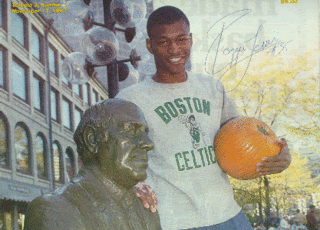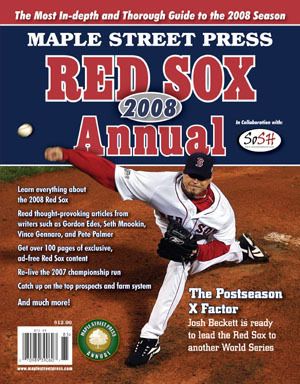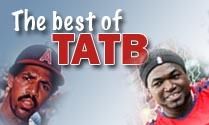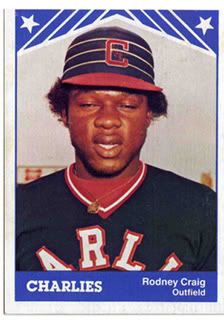Remembering Reggie, 10 years later

Ten years ago today, a young athlete's heart stopped beating, and a city's heart was broken.
It was on the morning of July 27, 1993 that Boston Celtics star Reggie Lewis collapsed while shooting baskets at Brandeis University. Lewis, who had been diagnosed with a heart ailment after fainting in an NBA playoff game three months earlier, was pronounced dead at 7:30 p.m. at Waltham-Weston Hospital. He was 27 years old.
Ten years. Damn. Has he really been gone so long? Can it be? Maybe it is true that a tragedy is never as far in the past as the calendar claims.
If Lewis's death is not the darkest moment in Boston sports history, it is on a very short list. It is one of those landmark moments when you remember exactly where you were when you were struck by the news.
Many of us were informed in somber tones by Sean McDonough on that evening's Red Sox telecast. I'm sure your reaction was similar to mine:
Please, no. Not again. Not Reggie.
It didn't feel real. So terribly, it was. For the second time in seven years, the Celtics had lost a promising player to a premature death. In 1986, Len Bias died of a cocaine overdose two days after he was selected second overall in the NBA draft.
Bias's death was shocking, but Lewis's was sadder. Bias was still fresh to the Boston sports scene, little more than a promising mystery. We had never even seen him in a Boston uniform, only in that now-infamous post-draft picture in which he's wearing a suit, a Celtics cap and a tell-tale Cheshire-cat grin. No, we certainly did not know Len Bias.
Maybe we did not know Lewis, either. But we had six Celtic seasons to become familiar with him, and it did not take nearly that long for us to adore him.
Lewis was poised and elegant, lithe and lanky, calm and cool. Close your eyes and you can still see him slithering baseline for a reverse layup, or pulling up oh-so-nonchalantly at the top of the key to swish yet another perfect jumper.
Lewis was the smoothest player ever to wear the green and white. And he was as graceful in the community as he was on the parquet. His annual Thanksgiving turkey giveaway was among the city's most well-known charitable endeavors. A certain post-Thanksgiving picture became a staple in The Boston Globe. There would be Lewis, offering his shy, warm smile and handing a turkey to someone in need of a happy holiday. It got you every time.
Those images, they endure. Sadly, the most enduring image is of The Fall.
It happened on April 29, 1993, early in the second quarter of a playoff game against the Charlotte Hornets. Trailing the play, Lewis crossed mid-court, stumbled and veered like a loopy drunk, and crumbled to the Boston Garden floor.
Watching a man normally so in control of his body suddenly become physically helpless was frightening. The look on his face was worse. It was one of confusion and fear, and it was all too familiar. We had seen it on the face of a dying Hank Gathers three years earlier.
Lewis survived the episode, only to have fate play its final cruel trick. The Fall foreshadowed his death three months later.
A decade after his passing, we are left with our scattered collection of memories, and just as many questions. It seems appropriate to pose the least significant first: Had Lewis lived and continued to play professional basketball, how might his career have played out?
He was already a star, one that shined brighter by the year. In 1991-92, he averaged 20.8 points a game and was named an All-Star. He became the first Celtic to amass 100 rebounds, 100 assists, 100 steals and 100 blocked shots in a single season. And like any true Celtic, he ratcheted up his game in the clutch. He averaged 28 points per game in the 1992 postseason.
His early career paralleled that of a peer from his 1987 draft class. Reggie Miller, the revered/reviled Indiana Pacers sharpshooter, has a plaque waiting for him at the Basketball Hall of Fame. It does not take an enormous act of hyperbole to suggest that Springfield might have beckoned for our Reggie too.
Lewis followed Larry Bird as captain, the sixth in Celtics history. He was the logical link from the glorious Bird/McHale/Parish Era to the next generation of Celtics' success. We are left to wonder how history might differ had he lived to fulfill his duties.
After his death, the devastated and misguided franchise paraded out a myriad of misfits and Todd Days while stumbling through the darkest days in its existence. Celtic Pride died with Lewis. Only recently, with the emergence of Paul Pierce and Antoine Walker, has it begun to reincarnate.
While this is a day to celebrate Lewis's life, we cannot in good conscience ignore the sinister questions about his death, because they are questions that will forever cloud his legacy.
In the subsequent months after his death, our eardrums were pounded by a shrill chorus of allegations and innuendoes. It was said that Lewis had more in common with Bias than we knew. People both credible and seedy claimed cocaine use was to blame for Lewis's scarred heart.
We will never know if something illicit caused him to fall that night against Charlotte. What we do know is that the proper course of treatment for his apparent heart problem was a matter of conflicting opinion. We also know that Lewis was willing to follow only the advice he wanted to hear. He switched doctors and hospitals after being told he should never play basketball again. It was a fateful, fatal decision.
After Lewis's death, his widow, Donna Harris Lewis, sued their physician, Dr. Gilbert Mudge - the lone doctor who said Lewis could play again after The Fall. The litigation dragged on for years. It is not good form to question the motives of a young widow, but it is fair to say she did little to enhance her late husband's memory.
The only good guy in this story is the one who did not survive it. Reggie Lewis would be 38 years old in November, and on this sad anniversary one can't help but ponder the most haunting question of all: What would his life be like today had his heart not betrayed him?
Perhaps he'd be retired from basketball, living happily ever after in the suburbs, coaching children and working on a paunch. Or perhaps he'd still be chasing his old rival Reggie Miller around the court while teaching those hyped hotshots named LeBron and Carmelo a trick or two. Whatever his life's path, he'd surely still be smiling.
Ten years pass in a blink, and our memories fade even as we resist. But reminders of Lewis find us often. They come in the form of a glance at his No. 35, swaying gently in the FleetCenter rafters. Or from a clicker-freezing old Celtics highlight on ESPN Classic.
Sometimes, we recognize him in others. Watch Pierce, in all his angular grace, stop and pop for a net-rustling jumper, and you can't help but smile at the recollection of Lewis doing the same.
God, Pierce does look like him sometimes. But he also reminds us of a sobering truth:
There may be some like Reggie Lewis. But there will never be another.
Rest in peace, Reggie.
Ten years after you left us, we still don't understand why you had to go.
(Originally published in the Concord Monitor.)
Labels: Monitor files, Reggie Lewis













|
<< Home